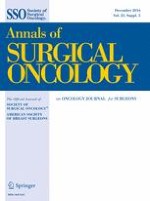01-12-2016 | Colorectal Cancer
Variation in Hospital-Specific Rates of Suboptimal Lymphadenectomy and Survival in Colon Cancer: Evidence from the National Cancer Data Base
Published in: Annals of Surgical Oncology | Special Issue 5/2016
Login to get accessAbstract
Background
Little is known about between-hospital differences in the rate of suboptimal lymphadenectomy. This study characterizes variation in hospital-specific rates of suboptimal lymphadenectomy and its effect on overall survival in a national hospital-based registry.
Methods
Stage I–III colon cancer patients were identified from the 2003–2012 National Cancer Data Base. Bayesian multilevel logistic regression models were used to assess the impact of patient- and hospital-level factors on hospital-specific rates of suboptimal lymphadenectomy (<12 lymph nodes), and multilevel Cox models were used to estimate the effect of suboptimal lymphadenectomy at the patient (yes vs. no) and hospital level (quartiles of hospital-specific rates) on overall survival.
Results
A total of 360,846 patients across 1345 hospitals in the US met the inclusion criteria, of which 25 % had a suboptimal lymphadenectomy. Wide variation was observed in hospital-specific rates of suboptimal lymphadenectomy (range 0–82 %, median 44 %). Older age, male sex, comorbidity score, no insurance, positive margins, lower tumor grade, lower T and N stage, and sigmoid and left colectomy were associated with higher odds of suboptimal lymphadenectomy. Patients treated at lower-volume and non-academic hospitals had higher odds of suboptimal lymphadenectomy. Patient- and hospital-level factors explained 5 % of the between-hospital variability in suboptimal lymphadenectomy, leaving 95 % unexplained. Higher suboptimal lymphadenectomy rates were associated with worse survival (quartile 4 vs. quartile 1: hazard ratio 1.19, 95 % confidence interval 1.16–1.22).
Conclusion
Large differences in hospital-specific rates of suboptimal lymphadenectomy were observed, and this variation was associated with survival. Quality improvement initiatives targeting hospital-level adherence to the national standard may improve overall survival among resected colon cancer patients.





